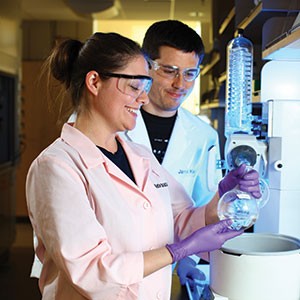With the addition of this year’s proceeds, the University of Oklahoma College of Medicine Evening of Excellence has awarded more than $2.5 million in seed grants for promising young faculty scientists to help them in their efforts to become competitive for national grants. OU President Boren made the announcement at the March meeting of the Board of Regents on the OU Health Sciences Center campus in Oklahoma City.
Sponsored by the College of Medicine Alumni Association, the Evening of Excellence has raised funds to award research grants to 129 investigators since 1985 and has achieved a $1 million endowment in support of future seed grants.
“These vital funds not only help launch the national competitiveness of junior researchers, but they also have a significant return on investment that results in improved health care, new businesses and more jobs to help grow Oklahoma’s economy,” Boren said.
Two examples of this success are William Hildebrand, Ph.D., Presbyterian Health Foundation Professor of Microbiology and Immunology; and Paul DeAngelis, Ph.D., President’s Associates Presidential Professor of Biochemistry and Molecular Biology.
Hildebrand, who joined the College of Medicine in 1993 as a junior investigator, received a $15,000 seed grant in 1994 from the College of Medicine Alumni Association from funds raised through the Evening of Excellence. He has since achieved millions in research funding from the National Institutes of Health, the Department of Defense, the National Marrow Donor Program, and others.
The overall theme of Hildebrand’s research focuses on the human body’s immune “surveillance system” as it responds to transplantation, autoimmunity, viruses and cancer. For example, every cell in the body has an alarm system, just as a house or car has an alarm system. Hildebrand studies cells’ alarm systems to learn, for example, how they distinguish cancerous cells from healthy cells. His aim is to stimulate beneficial immune response and reduce harmful immune responses.
Hildebrand also has turned his research into a commercial venture. In 1999, he founded Pure Protein, a biopharmaceutical company specializing in immunology tools. It was the first company to commercialize after the passage of State Questions 680 and 681, which allow a researcher to use university resources while letting the university have equity in the company. He continues to serve as chief scientific officer for the company, which is located in the Presbyterian Research Park.
Since then, Hildebrand has been able to commercialize several of his discoveries, such as improving transplant outcomes and screening blood supplies for transfusions. In 2000, he developed a precise DNA test to aid in identifying the best possible matches for certain transplant recipients. Labs around the world offer variations of this test.
DeAngelis joined the College of Medicine in 1994 and a year later was awarded a $20,000 seed grant from the Evening of Excellence research fund. He has gone on to draw significant funding from the National Institutes of Health and others, and has earned 33 patents in the United States.
DeAngelis’ research focuses on complex sugar molecules found in the human body that possess therapeutic value. For example, DeAngelis and his team have worked to synthesize a naturally occurring sugar polymer called heparosan, which can be used to more safely and effectively deliver drugs to treat diseases such as cancer and genetic disorders. The sugar molecule protects the drug against adverse reactions inside the body, and the drug’s beneficial effects tend to persist because it can stay in the body longer, necessitating fewer injections for the patient.
DeAngelis has founded four companies, for which he also serves as chief scientist. Each is headquartered in Oklahoma City. They are Hyalose, L.L.C., established 2000; Choncept, L.L.C., and Heparinex, L.L.C., both established 2002; and Caisson Biotech, L.L.C., established 2009. In 2012, Caisson entered into a development and license agreement with Novo Nordisk, a company that focuses on diabetes care. The agreement gives Novo Nordisk the exclusive rights to use Caisson’s proprietary heparosan-based drug delivery technology to engineer and develop compounds within undisclosed therapeutic areas.
This year’s Evening of Excellence honored Charles and Peggy Stephenson, lead donors to OU’s Cancer Center, and the Oklahoma Tobacco Settlement Endowment Trust, which funds a Tobacco Cessation Clinic and supports a program to help translate promising research into new and more effective cancer treatments. Also honored was Dr. Kenneth Cooper, widely known as the father of aerobics and credited with motivating people to exercise in pursuit of good health.
The Stephensons were awarded the Dean’s Award for Distinguished Community Service; TSET received the Dean’s Award to a Distinguished Oklahoma Institution; and Cooper was presented the Dean’s Award for Distinguished Medical Service.



